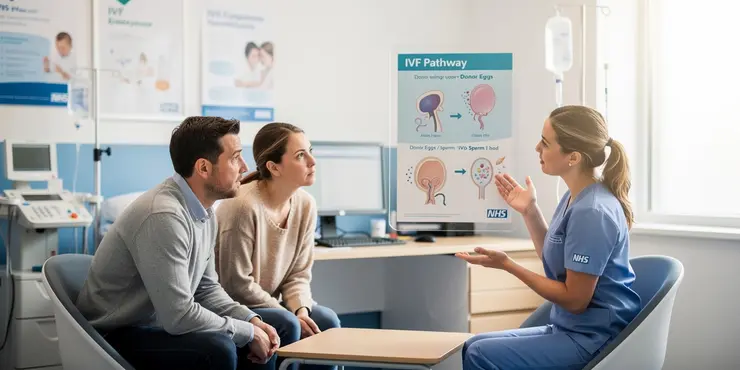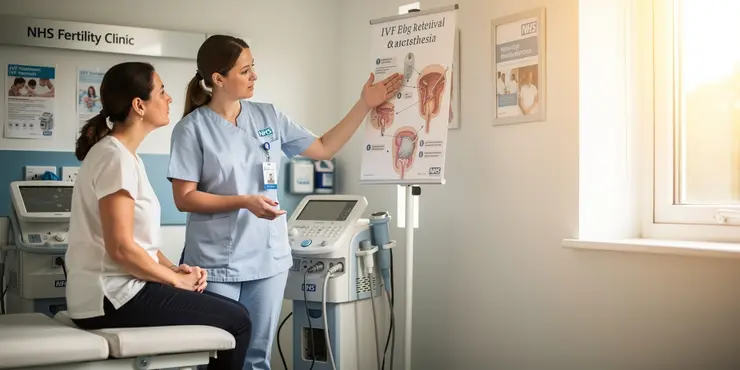
Find Help
More Items From Ergsy search
-

Does IVF guarantee pregnancy?
Relevance: 100%
-

Are there risks associated with IVF?
Relevance: 79%
-

Is IVF successful?
Relevance: 77%
-

What is IVF?
Relevance: 76%
-

How does IVF work?
Relevance: 74%
-

Who might need IVF?
Relevance: 73%
-

IVF Fertility Treatment from MumsNet
Relevance: 73%
-

What is IVF and how does it work?
Relevance: 73%
-

What are the main steps in an IVF cycle?
Relevance: 70%
-

Infertility - IVF Treatment and Patient Information
Relevance: 69%
-

How long does an IVF cycle take?
Relevance: 69%
-

How many embryos are usually transferred in IVF?
Relevance: 67%
-

What should I expect during IVF treatment?
Relevance: 67%
-

What is the role of the embryologist in IVF?
Relevance: 67%
-

How are embryos transferred during IVF?
Relevance: 66%
-

How is the sperm used in IVF?
Relevance: 64%
-

Can IVF be done with donor eggs or sperm?
Relevance: 63%
-

How do clinics determine if IVF is the right option?
Relevance: 62%
-

Does IVF require anesthesia?
Relevance: 59%
-

Can IVF be used for gender selection?
Relevance: 57%
-

Can medications affect pregnancy test results?
Relevance: 48%
-

How soon can a pregnancy test detect pregnancy?
Relevance: 46%
-
What is a pregnancy test?
Relevance: 45%
-

What if my pregnancy test is positive?
Relevance: 43%
-

Can a pregnancy test expire?
Relevance: 43%
-

HIV and pregnancy | NHS
Relevance: 43%
-

Is cycling safe during pregnancy?
Relevance: 42%
-

What are the different types of pregnancy tests?
Relevance: 41%
-

How does a pregnancy test work?
Relevance: 41%
-

Can a pregnancy test detect a miscarriage?
Relevance: 41%
-

When should I take a pregnancy test?
Relevance: 41%
-

What exercises can I do during pregnancy?
Relevance: 41%
-

Are there any exercises to avoid during pregnancy?
Relevance: 41%
-

How does exercise benefit pregnancy?
Relevance: 40%
-

Can I continue running during pregnancy?
Relevance: 40%
-

Can I do abdominal exercises during pregnancy?
Relevance: 40%
-

Gestational Diabetes during pregnancy
Relevance: 40%
-

Can stress affect a pregnancy test result?
Relevance: 39%
-

Can Zika virus affect pregnancy?
Relevance: 39%
-

Can postnatal depression affect subsequent pregnancies?
Relevance: 39%
Understanding IVF
In vitro fertilisation (IVF) is a form of assisted reproductive technology (ART) used to help individuals and couples achieve pregnancy. The procedure involves combining an egg and sperm outside the body, allowing fertilisation to occur in a controlled lab setting. Once the embryo forms, it is transferred to the uterus with the hope of a successful implantation and subsequent pregnancy.
Success Rates of IVF
While IVF has enabled many people to conceive, it does not guarantee pregnancy. Success rates vary based on numerous factors, including the age and health of the individuals involved, the clinic's expertise, and the specific techniques used. Typically, younger women under the age of 35 have higher success rates, which can be around 40% to 50% per cycle. For women over the age of 40, the success rate can drop to 5% to 15% per cycle. It's crucial to consult with healthcare professionals to understand personal success probabilities.
Factors Affecting IVF Success
Several factors can influence the success of IVF. Age is a significant determinant, as egg quality and quantity diminish over time. Additionally, underlying medical conditions such as polycystic ovary syndrome (PCOS), endometriosis, or male infertility issues can impact outcomes. Lifestyle factors like smoking, alcohol consumption, and weight can also affect success rates. The skill and experience of the fertility clinic and specialists, as well as the specific IVF protocol used, are other critical considerations.
Understanding "Guarantee" in the Context of IVF
While advancements in reproductive technology have improved outcomes, it's important to remember that IVF cannot guarantee pregnancy. The term "guarantee" implies certainty, which is not the case for IVF treatments. This is because a multitude of biological, medical, and even technical aspects can influence each cycle's outcome, making it impossible to ensure consistent success across all cases. Prospective parents should be prepared for the emotional and financial commitment that comes with the possibility of multiple cycles.
Making an Informed Decision
Considering IVF requires careful deliberation and informed decision-making. Those considering the procedure should seek detailed consultations with fertility specialists to understand their specific chances and the potential risks involved. Access to support groups or counseling services can be beneficial, offering emotional support throughout the process. Moreover, understanding the financial implications and exploring possible funding or insurance options is essential, as IVF can be a costly journey.
Conclusion
In summary, while IVF offers hope for many aspiring parents dealing with infertility, it does not guarantee pregnancy. Success involves a range of factors that can vary greatly between individuals. Patients are encouraged to discuss thoroughly with medical professionals to gain a realistic understanding of their IVF journey and make well-informed decisions regarding their family-planning goals.
Understanding IVF
IVF means "in vitro fertilisation." It helps people have babies. Doctors mix an egg and sperm outside the body in a lab. This is to make a baby. When the baby starts to grow, it is put back inside the mother. This is to help the mother become pregnant.
Success Rates of IVF
IVF can help many people have babies, but it doesn't always work. How well it works depends on things like age and health. Younger women have a better chance. For women under 35, it works 40% to 50% of the time. For women over 40, it works 5% to 15% of the time. It's important to talk to doctors to know your chances.
Factors Affecting IVF Success
Many things can change how well IVF works. Age is important. As women get older, it's harder to use their eggs. Health issues like PCOS or endometriosis can affect IVF. How healthy you are matters. Things like smoking and drinking can lower the chances, too. The skill of the doctors and the clinic's ways of doing IVF are also important.
Understanding "Guarantee" in the Context of IVF
IVF cannot promise a baby. "Guarantee" means it will definitely happen, which is not true for IVF. Many things can change the outcome, like medical issues or technical problems in the lab. So, it's important to be ready for trying IVF more than once. It can take time and money and be hard on feelings.
Making an Informed Decision
If you are thinking about IVF, it is important to learn and think carefully. Talk to doctors to know your chances and any risks. Support groups and talking to others can help with feelings. Also, think about the cost. Check if insurance can help with money issues, as IVF can be expensive.
Conclusion
To sum up, IVF gives hope to many who want to have children but can't. Still, it doesn't always lead to pregnancy. Different factors change how it works for each person. It's key to talk with doctors and make careful choices about having a family.
Frequently Asked Questions
Does IVF guarantee pregnancy?
No, IVF does not guarantee pregnancy. It significantly increases the chances compared to natural conception for some individuals, but success rates can vary based on several factors.
What factors influence the success rate of IVF?
The success rate of IVF can be influenced by age, the cause of infertility, lifestyle factors, and the specific protocols used by the fertility clinic.
What is the average success rate of IVF?
The average success rate of IVF is around 30% per cycle, although this can vary widely based on individual circumstances.
Are there any age limitations for IVF?
While there is no strict age limit for IVF, success rates generally decrease significantly for women over 40.
How many IVF cycles are typically needed to achieve pregnancy?
Many women may require more than one IVF cycle to achieve pregnancy, with an average of 2 to 3 cycles often recommended.
Is IVF more successful than IUI?
IVF generally has a higher success rate than IUI, especially for certain types of infertility.
Does embryo quality affect IVF success?
Yes, the quality of embryos can greatly impact the success of IVF, with higher-quality embryos being more likely to result in pregnancy.
Can lifestyle changes improve IVF success rates?
Healthy lifestyle changes, such as maintaining a healthy weight, reducing stress, and not smoking, can potentially improve IVF success rates.
Does male fertility affect IVF success?
Yes, male fertility factors can impact the success of IVF, which is why sperm quality is assessed during the IVF process.
What are the common reasons for IVF failure?
Common reasons for IVF failure include poor embryo quality, implantation failure, and age-related factors.
Can IVF be successful if I have PCOS?
Yes, IVF is often used successfully to help women with PCOS achieve pregnancy, although individual results can vary.
Does stress impact IVF success rates?
While stress is a concern for many trying to conceive, research on its direct impact on IVF success is mixed. Reducing stress can be beneficial overall.
Are there any medical conditions that might reduce IVF success?
Conditions such as fibroids, endometriosis, or uterine abnormalities can impact IVF success rates.
How does the selection of the fertility clinic affect IVF success?
Choosing a clinic with experienced staff and high success rates can improve your chances of IVF success.
Can multiple cycles of IVF be harmful?
Multiple cycles of IVF are generally considered safe, but it's important to discuss potential risks with your doctor.
What are the non-clinical factors influencing IVF success?
Non-clinical factors can include emotional support from family and partners, financial stress, and personal wellbeing.
Can donor eggs improve IVF success rates?
Donor eggs can improve IVF success rates, particularly for older women or those with specific fertility issues.
How soon after failed IVF can you try again?
The timing for trying another cycle of IVF varies; many clinics recommend a waiting period of at least one menstrual cycle.
Is IVF successful for all types of infertility?
While IVF can address many infertility issues, it is not successful for all types. It works best when there are issues with ovulation or blocked fallopian tubes.
Are there alternative treatments if IVF fails?
Yes, alternatives or adjuncts to IVF include IUI, lifestyle changes, fertility medications, and in some cases, considering adoption or surrogacy.
Does IVF always make you pregnant?
IVF is a medical way to help people have a baby. But it does not always mean you will get pregnant.
Sometimes it works, and sometimes it does not.
If you want to know more or need help, you can ask a doctor or a nurse.
No, IVF cannot promise a baby. But it can help some people have a better chance of getting pregnant than trying naturally. The chance to have a baby can be different for each person.
What helps IVF to work better?
How well IVF works can depend on:
- How old you are
- Why you can't have a baby
- How you live, like if you eat healthy and exercise
- What the doctor does to help
If you find reading hard, try using pictures or videos to help you understand. You can also ask someone to read with you.
How often does IVF work?
IVF stands for In Vitro Fertilization. It's a way to help people have babies.
IVF works for about 1 out of 3 tries.
It's like saying if 3 people try, 1 person might have a baby.
Here are some things that can help understand IVF better:
- Pictures and videos about IVF can help.
- Talk to a doctor or nurse if you have questions.
- Ask someone you trust to explain it to you.
When people try to have a baby with IVF, it works about 30 times out of 100. But, this can change a lot depending on each person's situation.
If you find reading hard, using tools like text-to-speech can help. Listening to the words might make it easier to understand.
Is there an age limit for IVF?
There is no set age when you can't do IVF, but it works less well for women over 40.
How many times do you usually need to try IVF to have a baby?
Many women need to try IVF more than once to get pregnant. Doctors usually say to try 2 or 3 times.
Which works better: IVF or IUI?
There are two ways to help people have a baby: IVF and IUI.
IVF stands for In Vitro Fertilization. Doctors take an egg from a woman and a sperm from a man and mix them in a lab to make an embryo. Then they put the embryo back in the woman’s body.
IUI stands for Intrauterine Insemination. Doctors put sperm directly into a woman’s womb to help her get pregnant.
IVF can work better than IUI, but it can be different for each person.
If you find this hard to understand, a family member, friend, or healthcare professional can help explain or give support.
IVF usually works better than IUI, especially for some types of infertility.
Can good embryos help IVF work better?
Yes, good embryos can make IVF work better. Better embryos have a higher chance of making a pregnancy happen.
Can changing how you live help with having a baby through IVF?
Living healthy can help IVF work better. Here are some tips:
- Keep your weight healthy.
- Stay calm and try not to worry too much.
- Don’t smoke cigarettes.
These changes might help IVF work better for you.
Try using tools like phone apps for stress or asking a doctor or friend for help.
Can a man's fertility change how well IVF works?
Yes, sperm from men can affect how well IVF works. This is why doctors check sperm carefully during IVF.
Why might IVF not work?
Sometimes, IVF (a way to help people have babies) doesn't work.
Here are some reasons why:
- The woman's eggs might not be strong enough.
- The man's sperm could have problems.
- The embryo (tiny baby) may not grow well.
- The woman's body might not be ready to have a baby.
If you have questions, talk to a doctor. They can help explain more.
IVF might not work for a few reasons:
1. The embryos (tiny babies) are not strong or healthy.
2. The embryo does not attach well to the mother's uterus (belly).
3. The age of the mother can also be a reason.
If you need help reading, try using tools like big text, pictures, or a read-aloud app.
Can IVF work if I have PCOS?
Some people with PCOS can have babies using IVF.
IVF stands for In-Vitro Fertilization. It is a way to help people have babies.
PCOS stands for Polycystic Ovary Syndrome. It is a health problem that affects how a woman's ovaries work.
A doctor can help you know if IVF is a good choice for you.
Using pictures can help understand better.
Talking with someone you trust can also help.
Yes, IVF can help women with PCOS have a baby. It works for many women, but not everyone is the same.
Does stress affect IVF success?
Does being worried make it harder for IVF to work?
Stress can worry people who want to have a baby. Scientists are not sure exactly how stress affects IVF, which is a treatment to help have babies. But feeling less stress can be good for you.
Can some health problems make IVF harder?
Things like fibroids, endometriosis, or problems with the uterus can make it harder for IVF to work.
Need some help?
- You can use tools that read text out loud.
- Pictures can also help you understand better.
How does choosing a fertility clinic affect IVF success?
Picking the right fertility clinic is important for IVF. Here is how it can help:
- Experience: Clinics with more experience usually do better.
- Success Rate: Look for clinics with high success rates for IVF.
- Support: Good clinics give lots of care and help.
Ask questions and talk to doctors before you choose. It can make a big difference.
Pick a clinic with staff who know a lot and have helped many people. This can make it more likely for IVF to work well.
Is it bad to have IVF more than once?
Doing IVF more than once is usually safe. But it's good to talk to your doctor about any risks.
What Things Can Affect IVF Success?
IVF, or In Vitro Fertilization, is a way to help people have a baby. Some things that are not medical can change how well IVF works. Here are some of them:
- Age: Younger women usually have higher chances of IVF success.
- Lifestyle: Eating healthy, not smoking, and not drinking too much alcohol can help.
- Weight: Being at a healthy weight is important.
- Stress: Feeling relaxed and having support can make a difference.
Here are some tools that can help:
- Talk to a counselor if you feel worried or stressed.
- Join a support group to share feelings with others.
- Use meditation or relaxation apps to stay calm.
Things that are not medical, like help from family and friends, money worries, and feeling good about yourself, can affect your health.
Can using donor eggs help IVF work better?
Using eggs from another person can help make IVF work better. It can be especially helpful for older women or women who have trouble getting pregnant.
When can you try IVF again after it doesn't work?
After trying IVF, it's good to wait before trying again. Many doctors say to wait for one period to pass first.
Does IVF work for everyone who has trouble having a baby?
IVF stands for In-Vitro Fertilization. It is a special way to help people have babies.
IVF does not work for everyone. Some people may need different help to have a baby.
If you are worried about having a baby, it is a good idea to talk to a doctor. A doctor can tell you what might be best for you.
There are some things that can help you understand more:
- Ask questions: If something is confusing, it is okay to ask. People are there to help you understand.
- Use pictures: Looking at pictures can help you understand how IVF and other treatments work.
- Get support: Talking to friends or family can make you feel better. They can help you remember things and make choices.
IVF helps some people have babies. It is good if there are problems with ovulation or if the fallopian tubes are blocked. But it does not work for everyone.
What can you do if IVF doesn't work?
If IVF (a treatment to help people have a baby) doesn't work, there are other things you can try.
Here are some other options:
- Try IVF again: Sometimes doing it again can help.
- Look at different treatments: Talk to your doctor about other ways to have a baby.
- Think about adoption: You can also adopt a child who needs a family.
- Talk to someone: Speak to a counselor. They can help you with your feelings.
Helpful tools:
- Support groups: Join groups where people share their experiences.
- Websites: Look for websites with trusted information.
- Apps: Use apps that offer tips and support.
Always talk to your doctor about what is best for you.
Yes, there are other ways to help people have a baby besides IVF. These include:
- IUI: This is a simple medical procedure to help with pregnancy.
- Healthy Habits: Eating well and exercising can help.
- Medicines: There are special medicines that can help people get pregnant.
- Adoption: This means welcoming a child into your family who needs a home.
- Surrogacy: This is when another person carries the baby for you.
Sometimes, using things like pictures or talking to someone who knows about these options can help you understand better.
Useful Links
This website offers general information and is not a substitute for professional advice.
Always seek guidance from qualified professionals.
If you have any medical concerns or need urgent help, contact a healthcare professional or emergency services immediately.
Some of this content was generated with AI assistance. We’ve done our best to keep it accurate, helpful, and human-friendly.
- Ergsy carfully checks the information in the videos we provide here.
- Videos shown by Youtube after a video has completed, have NOT been reviewed by ERGSY.
- To view, click the arrow in centre of video.
- Most of the videos you find here will have subtitles and/or closed captions available.
- You may need to turn these on, and choose your preferred language.
- Go to the video you'd like to watch.
- If closed captions (CC) are available, settings will be visible on the bottom right of the video player.
- To turn on Captions, click settings .
- To turn off Captions, click settings again.
More Items From Ergsy search
-

Does IVF guarantee pregnancy?
Relevance: 100%
-

Are there risks associated with IVF?
Relevance: 79%
-

Is IVF successful?
Relevance: 77%
-

What is IVF?
Relevance: 76%
-

How does IVF work?
Relevance: 74%
-

Who might need IVF?
Relevance: 73%
-

IVF Fertility Treatment from MumsNet
Relevance: 73%
-

What is IVF and how does it work?
Relevance: 73%
-

What are the main steps in an IVF cycle?
Relevance: 70%
-

Infertility - IVF Treatment and Patient Information
Relevance: 69%
-

How long does an IVF cycle take?
Relevance: 69%
-

How many embryos are usually transferred in IVF?
Relevance: 67%
-

What should I expect during IVF treatment?
Relevance: 67%
-

What is the role of the embryologist in IVF?
Relevance: 67%
-

How are embryos transferred during IVF?
Relevance: 66%
-

How is the sperm used in IVF?
Relevance: 64%
-

Can IVF be done with donor eggs or sperm?
Relevance: 63%
-

How do clinics determine if IVF is the right option?
Relevance: 62%
-

Does IVF require anesthesia?
Relevance: 59%
-

Can IVF be used for gender selection?
Relevance: 57%
-

Can medications affect pregnancy test results?
Relevance: 48%
-

How soon can a pregnancy test detect pregnancy?
Relevance: 46%
-
What is a pregnancy test?
Relevance: 45%
-

What if my pregnancy test is positive?
Relevance: 43%
-

Can a pregnancy test expire?
Relevance: 43%
-

HIV and pregnancy | NHS
Relevance: 43%
-

Is cycling safe during pregnancy?
Relevance: 42%
-

What are the different types of pregnancy tests?
Relevance: 41%
-

How does a pregnancy test work?
Relevance: 41%
-

Can a pregnancy test detect a miscarriage?
Relevance: 41%
-

When should I take a pregnancy test?
Relevance: 41%
-

What exercises can I do during pregnancy?
Relevance: 41%
-

Are there any exercises to avoid during pregnancy?
Relevance: 41%
-

How does exercise benefit pregnancy?
Relevance: 40%
-

Can I continue running during pregnancy?
Relevance: 40%
-

Can I do abdominal exercises during pregnancy?
Relevance: 40%
-

Gestational Diabetes during pregnancy
Relevance: 40%
-

Can stress affect a pregnancy test result?
Relevance: 39%
-

Can Zika virus affect pregnancy?
Relevance: 39%
-

Can postnatal depression affect subsequent pregnancies?
Relevance: 39%


